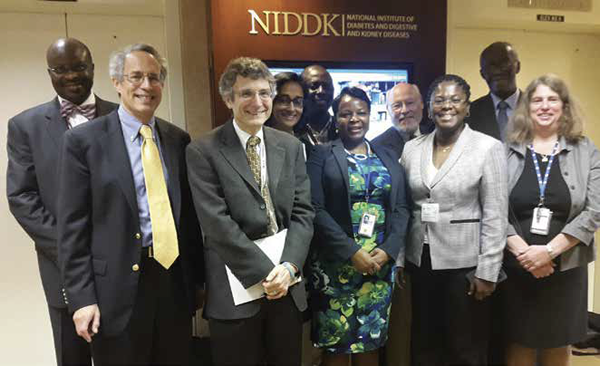One goal of our outreach efforts is to spread the knowledge of genetics across the globe to reach diverse and under-served populations. To this end, the Department of Human Genetics partners with programs such as the Human Heredity and Health in Africa (H3Africa) Initiative. This program, supported by the Welcome Trust and the National Institutes of Health Common Fund, was established to expand genetics research efforts across all of Africa by training young investigators and improving research infrastructure.
Last fall, two physician faculty members involved with H3Africa joined our Master’s degree program: Dr. Charlotte Osafo, from the University of Ghana, Accra; and Dr. Yemi Raji, from the University of Ibadan in Nigeria.
Dr. Osafo and Dr. Raji are kidney specialists on a mission to learn the foundations of genetics to help them understand the genetic etiology of kidney disease. They are co-principal investigators of the H3Africa Kidney Disease Research Network, aiming to establish genomics labs and collect thousands of patient DNA samples in their home countries. But to have an impact, they need technical and analytical skills in genetics. They had both noticed a striking difference in the profile of patients with kidney disease in African versus western populations. Dr. Osafo noted that patients she saw during her nephrology fellowship in the UK had slowly progressing kidney disease, brought on by risk factors such as diabetes or hypertension. In contrast, most of her patients in Africa were young and without risk factors, and presented suddenly with aggressive kidney disease. Dr. Raji, who was pursuing his Nephrology residency in Nigeria, found the same pattern of aggressive kidney disease among the sub-Saharan African population. They both hoped hat genetic research could help unlock the clues to this mystery.
Dr. Osafo and Dr. Raji arrived in Ann Arbor eager to soak up genetic knowledge, despite being out of the classroom for nearly 20 years. Over the past eighteen months, they completed the rigorous Human Genetics curriculum and learned invaluable research skills in genetics, genomics, and bioinformatics from many department labs. Dr. Osafo and Dr. Raji will earn their MS degrees at the end of Fall 2017 and will return home with more than just their diplomas. As ambassadors of genetics, they will teach and mentor the next generation of researchers and clinicians in their communities. Their efforts will have a major impact in the practices and standard of care for the patients in their hospitals, as well as the educational experiences of their trainees at their universities.

